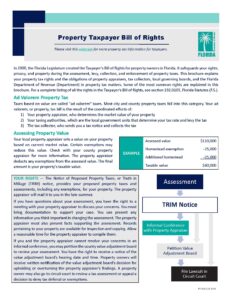The 2000 Florida Legislature created the Taxpayer’s Bill of Rights for property owners
in Florida. It safeguards your rights, privacy, and property during the assessment, levy,
collection, and enforcement of property taxes.

CALL: (904) 827-5500
EMAIL: sjcpa@sjcpa.gov
2025 Holiday Schedule
Under Florida law, e-mail addresses are public records. If you do not want your e-mail address released in response to a public records request, do not send electronic mail to this entity. Instead, contact this office by phone or in writing.